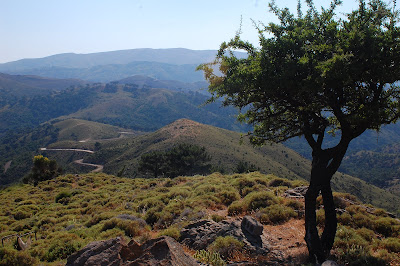
Chios, one of the largest Greek islands, is sparsely populated. It has the feel of Iceland or Ireland: rugged, ancient, and somewhat emptied out.

In 1822 the Ottomans invaded and killed or exiled much of the population. We visited a couple of 1,000-year old monasteries.

One keeps the bones of some of the victims (3,000 local women and children had sought refuge there) in a side chapel.

The towns are medieval, heavily fortified, and further protected by absurdly narrow streets. The village we stayed in, Avgonima, has been lived in for a thousand years.

Pyrgi, in the south, is charming, with black and white patterns on its buildings (cribbed from Sicily). Columbus lived here when it was a Genoese outpost.


Almost everyone we met had a New York connection. It was funny pulling up to some medieval town in the middle of nowhere and being greeted by a Brooklyn accent.

 Chios, one of the largest Greek islands, is sparsely populated. It has the feel of Iceland or Ireland: rugged, ancient, and somewhat emptied out.
Chios, one of the largest Greek islands, is sparsely populated. It has the feel of Iceland or Ireland: rugged, ancient, and somewhat emptied out. In 1822 the Ottomans invaded and killed or exiled much of the population. We visited a couple of 1,000-year old monasteries.
In 1822 the Ottomans invaded and killed or exiled much of the population. We visited a couple of 1,000-year old monasteries. One keeps the bones of some of the victims (3,000 local women and children had sought refuge there) in a side chapel.
One keeps the bones of some of the victims (3,000 local women and children had sought refuge there) in a side chapel. The towns are medieval, heavily fortified, and further protected by absurdly narrow streets. The village we stayed in, Avgonima, has been lived in for a thousand years.
The towns are medieval, heavily fortified, and further protected by absurdly narrow streets. The village we stayed in, Avgonima, has been lived in for a thousand years. Pyrgi, in the south, is charming, with black and white patterns on its buildings (cribbed from Sicily). Columbus lived here when it was a Genoese outpost.
Pyrgi, in the south, is charming, with black and white patterns on its buildings (cribbed from Sicily). Columbus lived here when it was a Genoese outpost.
 Almost everyone we met had a New York connection. It was funny pulling up to some medieval town in the middle of nowhere and being greeted by a Brooklyn accent.
Almost everyone we met had a New York connection. It was funny pulling up to some medieval town in the middle of nowhere and being greeted by a Brooklyn accent.


2 comments:
F'n New Yorkers, everywhere! Seriously though, are those NY plates in Chios? How did he drive there?
Keep 'em coming man - loving the photo series.
Probably the only Volvo on the island -- those streets are built for scooters and tiny Japanese cars. I assume that got ferried in, along with the daily supplies it takes to keep 50,000 people alive. (The island's population was around 120,000 in 400BC).
Post a Comment